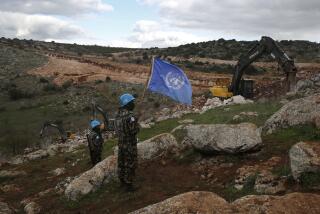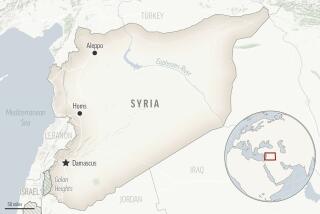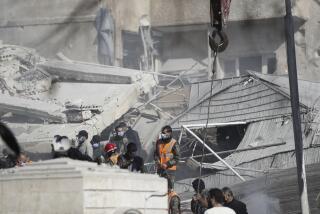Lebanon clashes raise fear of ‘spillover’ in Syria violence
BEIRUT — Deadly sectarian street battles linked to strife in neighboring Syria erupted Saturday in northern Lebanon, as special United Nations envoy Kofi Annan warned about “regional spillover” from a possible “all-out civil war” in Syria.
Gunfights raged Saturday in the Lebanese coastal city of Tripoli, where supporters and opponents of Syria’s President Bashar Assad exchanged machine-gun fire and rocket-propelled grenade volleys across a densely populated urban cityscape.
By early evening, Lebanon’s official National News Agency reported at least 10 people had been killed and more than two dozen wounded.
The gun battles in Tripoli highlight the bitter sectarian and political rivalry between adjoining neighborhoods: Bab al Tabbaneh, a largely Sunni Muslim area where anti-Assad sentiment is strong; and the Jabal Mohsen district, a pro-Assad stronghold. Jabal Mohsen is home to many adherents of the Alawite sect, whose members include Assad and much of the Syrian president’s security leadership.
The split in Tripoli reflects the divisions in Syria, where Sunnis, the majority population, have been at the forefront of the year-plus rebellion, while Alawites and other minority groups have generally supported Assad.
Tension linked to the Syrian revolt has been boiling over in Tripoli for months, occasionally resulting in open urban warfare.
But the intensity of Saturday’s clashes renewed concern that the fighting next door could destabilize Lebanon, with its own complex mix of rival sects and history of civil strife.
Late Saturday, Lebanese Prime Minister Najib Mikati and Interior Minister Marwan Charbel rushed to Tripoli in a bid to end the latest round of clashes there, underscoring the gravity of the situation.
Meanwhile, in Qatar, Annan gave one of his bleakest assessments to date of the situation, conceding that his six-point peace plan is in peril.
“The specter of all-out civil war, with a worrying sectarian dimension, grows by the day,” Annan said in an address to ministers in Doha, the Qatari capital. “The crisis is having regional spillover.”
Annan, who has acknowledged being frustrated, again put the onus on Assad to “make bold and visible steps immediately to radically change his military posture and honor his commitment to withdraw heavy weapons and cease all violence.”
The Syrian government maintains that it has complied with Annan’s peace plan and blames armed “terrorists” — its shorthand for antigovernment rebels — for having failed to stop the violence. The U.N. and independent experts say both sides have largely ignored the peace blueprint.
In a pointed warning, Annan said that “things cannot continue as they are,” though he did not elaborate on what the next step might be.
Qatar, a small but wealthy monarchy that has assumed a robust role in regional affairs, urged Annan to set a deadline for his Syrian peace mission and asked the U.N. Security Council to consider other unspecified actions.
“It is unacceptable that the massacres and bloodshed continue while the mission is ongoing indefinitely,” declared Qatari Prime Minister Sheik Hamad bin Jassim al Thani, whose government supports the Syrian rebels.
In Tripoli, authorities said, gunfire broke out around midnight Friday and continued sporadically through the night, intensifying Saturday.
Video from the city showed plainclothes gunmen squeezing off AK-47 rounds while crouching behind walls, apartment buildings and mounds of tires, as armored vehicles carrying Lebanese security forces rumbled through the deserted streets.
The National News Agency reported that “rocket bombs” could be heard every 10 minutes Saturday afternoon and that snipers were targeting people at two traffic roundabouts and along the international highway.
Amid the heightened tension related to the violence in Syria, 11 people were killed and 100 were wounded in a wave of street battles last month in the coastal city, according to the Daily Star, a Beirut-based English-language daily.
Sandels is a special correspondent.
More to Read
Start your day right
Sign up for Essential California for news, features and recommendations from the L.A. Times and beyond in your inbox six days a week.
You may occasionally receive promotional content from the Los Angeles Times.






